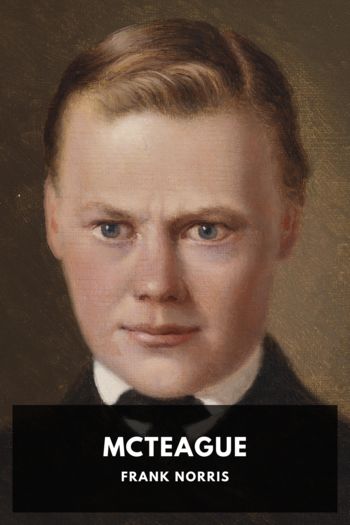McTeague, Frank Norris [polar express read aloud .txt] 📗

- Author: Frank Norris
Book online «McTeague, Frank Norris [polar express read aloud .txt] 📗». Author Frank Norris
Heise and Trina went back into the kitchen with the two policemen, the third man in citizen’s clothes cleared the intruders from the front room of the junk shop and kept the crowd back, his arm across the open door.
“Whew!” whistled one of the officers as they came out into the kitchen, “cutting scrape? By George! somebody’s been using his knife all right.” He turned to the other officer. “Better get the wagon. There’s a box on the second corner south. Now, then,” he continued, turning to Trina and the harness-maker and taking out his notebook and pencil, “I want your names and addresses.”
It was a day of tremendous excitement for the entire street. Long after the patrol wagon had driven away, the crowd remained. In fact, until seven o’clock that evening groups collected about the door of the junk shop, where a policeman stood guard, asking all manner of questions, advancing all manner of opinions.
“Do you think they’ll get him?” asked Ryer of the policeman. A dozen necks craned forward eagerly.
“Hoh, we’ll get him all right, easy enough,” answered the other, with a grand air.
“What? What’s that? What did he say?” asked the people on the outskirts of the group. Those in front passed the answer back.
“He says they’ll get him all right, easy enough.”
The group looked at the policeman admiringly.
“He’s skipped to San Jose.”
Where the rumor started, and how, no one knew. But every one seemed persuaded that Zerkow had gone to San Jose.
“But what did he kill her for? Was he drunk?”
“No, he was crazy, I tell you—crazy in the head. Thought she was hiding some money from him.”
Frenna did a big business all day long. The murder was the one subject of conversation. Little parties were made up in his saloon—parties of twos and threes—to go over and have a look at the outside of the junk shop. Heise was the most important man the length and breadth of Polk Street; almost invariably he accompanied these parties, telling again and again of the part he had played in the affair.
“It was about eleven o’clock. I was standing in front of the shop, when Mrs. McTeague—you know, the dentist’s wife—came running across the street,” and so on and so on.
The next day came a fresh sensation. Polk Street read of it in the morning papers. Towards midnight on the day of the murder Zerkow’s body had been found floating in the bay near Black Point. No one knew whether he had drowned himself or fallen from one of the wharves. Clutched in both his hands was a sack full of old and rusty pans, tin dishes—fully a hundred of them—tin cans, and iron knives and forks, collected from some dump heap.
“And all this,” exclaimed Trina, “on account of a set of gold dishes that never existed.”
XVIIOne day, about a fortnight after the coroner’s inquest had been held, and when the excitement of the terrible affair was calming down and Polk Street beginning to resume its monotonous routine, Old Grannis sat in his clean, well-kept little room, in his cushioned armchair, his hands lying idly upon his knees. It was evening; not quite time to light the lamps. Old Grannis had drawn his chair close to the wall—so close, in fact, that he could hear Miss Baker’s grenadine brushing against the other side of the thin partition, at his very elbow, while she rocked gently back and forth, a cup of tea in her hands.
Old Grannis’s occupation was gone. That morning the bookselling firm where he had bought his pamphlets had taken his little binding apparatus from him to use as a model. The transaction had been concluded. Old Grannis had received his check. It was large enough, to be sure, but when all was over, he returned to his room and sat there sad and unoccupied, looking at the pattern in the carpet and counting the heads of the tacks in the zinc guard that was fastened to the wall behind his little stove. By and by he heard Miss Baker moving about. It was five o’clock, the time when she was accustomed to make her cup of tea and “keep company” with him on her side of the partition. Old Grannis drew up his chair to the wall near where he knew she was sitting. The minutes passed; side by side, and separated by only a couple of inches of board, the two old people sat there together, while the afternoon grew darker.
But for Old Grannis all was different that evening. There was nothing for him to do. His hands lay idly in his lap. His table, with its pile of pamphlets, was in a far corner of the room, and, from time to time, stirred with an uncertain trouble, he turned his head and looked at it sadly, reflecting that he would never use it again. The absence of his accustomed work seemed to leave something out of his life. It did not appear to him that he could be the same to Miss Baker now; their little habits were disarranged, their customs broken up. He could no longer fancy himself so near to her. They would drift apart now, and she would no longer make herself a cup of tea and “keep company” with him when she knew that he would never again sit before his table binding uncut pamphlets. He had sold his happiness for money; he had bartered all his tardy romance for some miserable banknotes. He had not foreseen that it would be like this. A vast regret welled up within him. What was that on the back of his hand? He wiped it dry with his ancient silk handkerchief.
Old Grannis leant his





Comments (0)